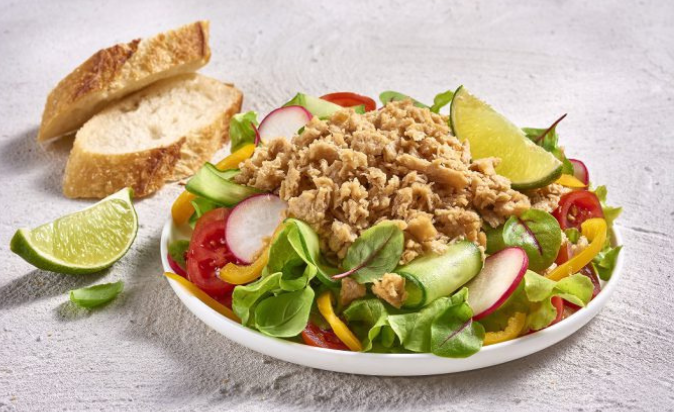FoodTech Start-up Vgarden Makes Plant-Based, Flaky Canned Tuna with a Clean Label.
- Jan. 12, 2023
- FMCG HORECA BUSINESS

Vgarden, Ltd., a creator and producer of plant-based alternatives, introduces a revolutionary vegan tuna in a can. The 100% plant-based product is identical in look, texture, and taste of the canned staple. The tuna analog is a creative approach to the problem of the overfished and quickly dwindling ocean populations of wild tuna designed to meet the appetites of the expanding number of sustainability-minded customers.
Ilan Adut, CEO of Vgarden, adds, "Tuna in a can has a very characteristic flaky, but moist and chewy texture, together with a strong scent of sea air." "Our novel product that resembles tuna is label-free, scalable, inexpensive, and sustainable. But for our plant-based product to function as a legitimate alternative, it must equal tuna's nutritional content as closely as possible, in addition to convincingly imitating all of the sensory attributes."
After a year of experimenting with ingredients and methods, the startup established its winning combination for plant-based tuna. The private-label product is now being distributed in the retail and food service industries. It is offered in two packing formats: pouches for refrigerated storage and genuine cans for true tuna flavor and handy non-refrigerated storage. The objective of Vgarden's research and development was to create a tuna that could be canned and sterilized at high temperatures while retaining its complete taste and texture. The firm has submitted a patent application for the formula and method.
Why Is There a Catch?
Before and after filtering, Vgarden's tuna substitute is based on pea protein with a total protein concentration of 11.2-14%. A brief list of natural components, including fibers and sunflower oil, are included. The startup's "tuna-free" tuna is devoid of hazardous metals, microplastics, and other ocean contaminants since it is derived from outside the marine environment. Its patented production technique consumes minimum energy and water, relieving marine life of its burden and providing customers with a highly sustainable and guilt-free seafood alternative.
"Aquaculture and overfishing of this in-demand fish have had such a terrible impact on their numbers that certain species, such as the Atlantic Bluefin and the yellowfin, are on the verge of extinction," says Tom Rothman, head of worldwide sales at Vgarden. This not only threatens food security, but also disrupts the delicate balance of the marine ecosystem. Our plant-based tuna solution may help reverse this ecocatastrophe and contribute to the recovery of wild tuna populations in the ocean."
Tuna is the most popular fish in the world.
Tuna is the most eaten fish in the world, according to a UN survey. The worldwide market for tuna fish is anticipated to increase from USD 41.06 billion in 2022 to USD 49.70 billion in 2029. Tuna in a can is a popular source of inexpensive protein that is easy to store and does not need refrigeration. Europe and Asia are the largest consumers of tuna in a can, with South America and the Middle East quickly catching up. Tuna's popularity correlates with a significant increase in health-conscious, socially and environmentally driven customers seeking plant-based seafood alternatives.
Vgarden was established by Kibbutz Gan Shmuel and the Eliav family, and it has been gaining ground on the plant-based curve. The firm has previously introduced a number of meat and dairy replacements under the MashuMashu brand in Israel. The vegan brand is quickly becoming a household name among the dairy-intolerant and expanding flexitarian communities. Israel, which has more vegans and vegetarians per capita than any other Western country, is already offering the portfolio in a number of major restaurant and pizza brands.
In addition to doing well in Australia, Canada, Asia, and Europe, Vgarden's assortment of fake hard cheeses is gaining attention among food makers and food service businesses in Germany and Austria. Recently, Vgarden and Cale and Daughters, of Sydney, agreed into a joint venture to create a new dairy and meat substitute production plant in Australia. It is anticipated that the facility would achieve full capacity by the end of 2023.
How do you like your tuna-free tuna?
Vegan tuna from Vgarden may be used into any classic tuna-based dish, including tuna mayo sandwiches, salads, toasts, pastas, sushi, and pizza, among others. The business is now targeting the worldwide alternative protein market for the introduction of their tuna substitute. Adut writes, "many restaurants are turning to our tuna analog to make a traditional tuna nicoise salad or a tuna spaghetti that will offer their discriminating flexitarian guests the complete experience of the genuine thing."
About Vgarden
Vgarden is a major producer and maker of vegan cuisine made from plants. The team of professionals at Vgarden, formerly known as Gan-Shmuel Health Industries (2017) Agricultural Cooperative Society Ltd., creates and distributes an extensive selection of cheeses, spreads, pastries, and nuggets. All of Vgarden's retail cheeses are non-GMO and devoid of additives, lactose, gluten, trans fats, soy, and cholesterol. Leumi Partners provided the firm with more than USD 15 million in strategic first capital to promote product development and worldwide activities.



